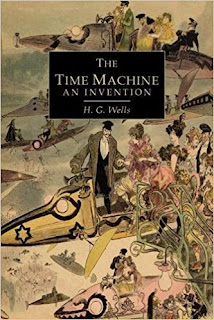Book Review: H.G. Well's The Time Machine & D.H. Lawrence's Sons and Lovers
Apparently, most people read H.G. Well's The Time Machine in middle school. However, I imagine that it's difficult to grasp Well's socio-political critique of Victorian Britain unless one is familiar with a theoretical understanding of European history.
I'm sure it's superfluous to say that science fiction is rarely entirely about science. Rather, it's generally about political and philosophical issues. And, ultimately what is science about? It's about questioning the unknown and relying on existing data to make predictions.
I compare The Time Machine with D.H. Lawrence's Sons & Lovers because both writers were educated, but low-income. Also in the aforementioned titles, both appear repulsed by the working classes.
In Sons & Lovers, Lawrence's main character adored his refined mother of a superior social class. But despised his temperamental, alcoholic coal-mining father. Meanwhile, Wells, a socialist, describes the Morlocks as predatory beasts who live in tunnels below the genteel, but ineffectual Eloi. Arguably, Wells had the coal miners in mind when he wrote The Time Machine.
The Time Machine suggests that while Wells was critical of the British upper-classes, he felt protective of them. I also think his story is intended as a warning regarding the lack of care given to the working classes. In other words, the dichotomy would give rise to the working classes increasingly savage nature and an imminent uprising against the elite. In Wells case, he didn't need to look to the future to predict violent social uprisings. Instead, he could rely upon previous revolutions such as the one in France.
#ScienceFiction #VictorianLiterature #VictorianBritain #History #Philosophy #Politics #Classstruggle #Proletariat #Capitalism #DegenerateUpperclasses #Aristocrats #Wealth #HGWells #TimeMachine #DHLawrence #SonsandLovers #Romanticism #Elitism #Hypocrisy #Liberalism #Conservative




Comments
Post a Comment